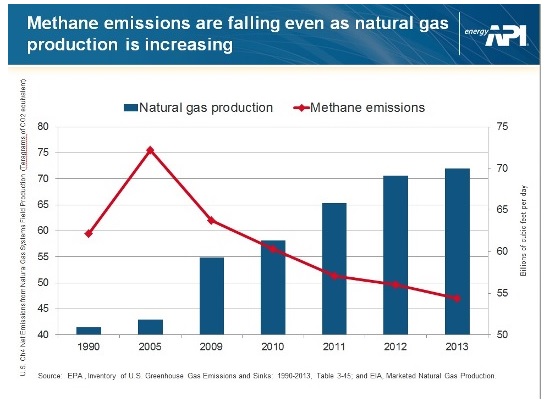EPA – Messing With Success on Methane
Mark Green
Posted August 18, 2015
So, the EPA looked at declining methane emissions …
- Down 79 percent from hydraulically fractured wells since 2005
- Down 38 percent from natural gas production overall from 2005 to 2013
- Emissions down – while natural gas production soared (chart, below)

… and decided new methane regulations were the thing to do anyway.
When describing the regulatory avalanche rolling forth from EPA and other parts of the Obama administration, proposed new rules on methane fit right in – alongside the push for new ozone standards (as ozone levels are falling), new hydraulic fracturing rules (on top of effective state rules) and continuation of the outdated Renewable Fuel Standard, with potential risks to the economy and individual consumers.
Again, in the context of falling methane emissions from oil and natural gas development, EPA’s new proposal is a solution in search of a problem. It illustrates an agency bent on regulating for the sake of regulating. Think about it: EPA is proposing unnecessary obstacles to the oil and natural gas production that was key to the economy’s recovery from recession, cited by the president’s Council of Economic Advisers in its annual report earlier this year:
Over the past ten years, the U.S. economy has undergone a revolution in the production and consumption of energy. Increasing production of oil, natural gas, and renewable energy has contributed broadly to employment and gross domestic product (GDP) growth during the recovery from the Great Recession.
The fact is industry is leading the way on reducing methane. It is highly motivated to do so, which is a big reason emissions have been falling. Howard Feldman, API’s senior director of regulatory and scientific affairs:
“The latest (EPA) inventory shows that U.S. producers continue to make dramatic improvements … These voluntary efforts will continue, as operators work to capture more gas and deliver it to consumers. Another layer of burdensome regulations will only interfere with that progress.”
Industry supports efforts that have and will be effective in lowering methane emissions. It does not support unnecessary, duplicative proposals that could significantly impact energy production and costs to consumers. API President and CEO Jack Gerard:
“API supports a common sense regulatory approach that builds on cost-effective controls already required by EPA for new equipment. Combined with smart, voluntary efforts for existing sources, this approach will continue to lower methane emissions. To avoid undermining American competitiveness, we urge the EPA to coordinate its efforts and not add duplicative rules.”
About The Author
Mark Green joined API after a career in newspaper journalism, including 16 years as national editorial writer for The Oklahoman in the paper’s Washington bureau. Previously, Mark was a reporter, copy editor and sports editor at an assortment of newspapers. He earned his journalism degree from the University of Oklahoma and master’s in journalism and public affairs from American University. He and his wife Pamela have two grown children and six grandchildren.


